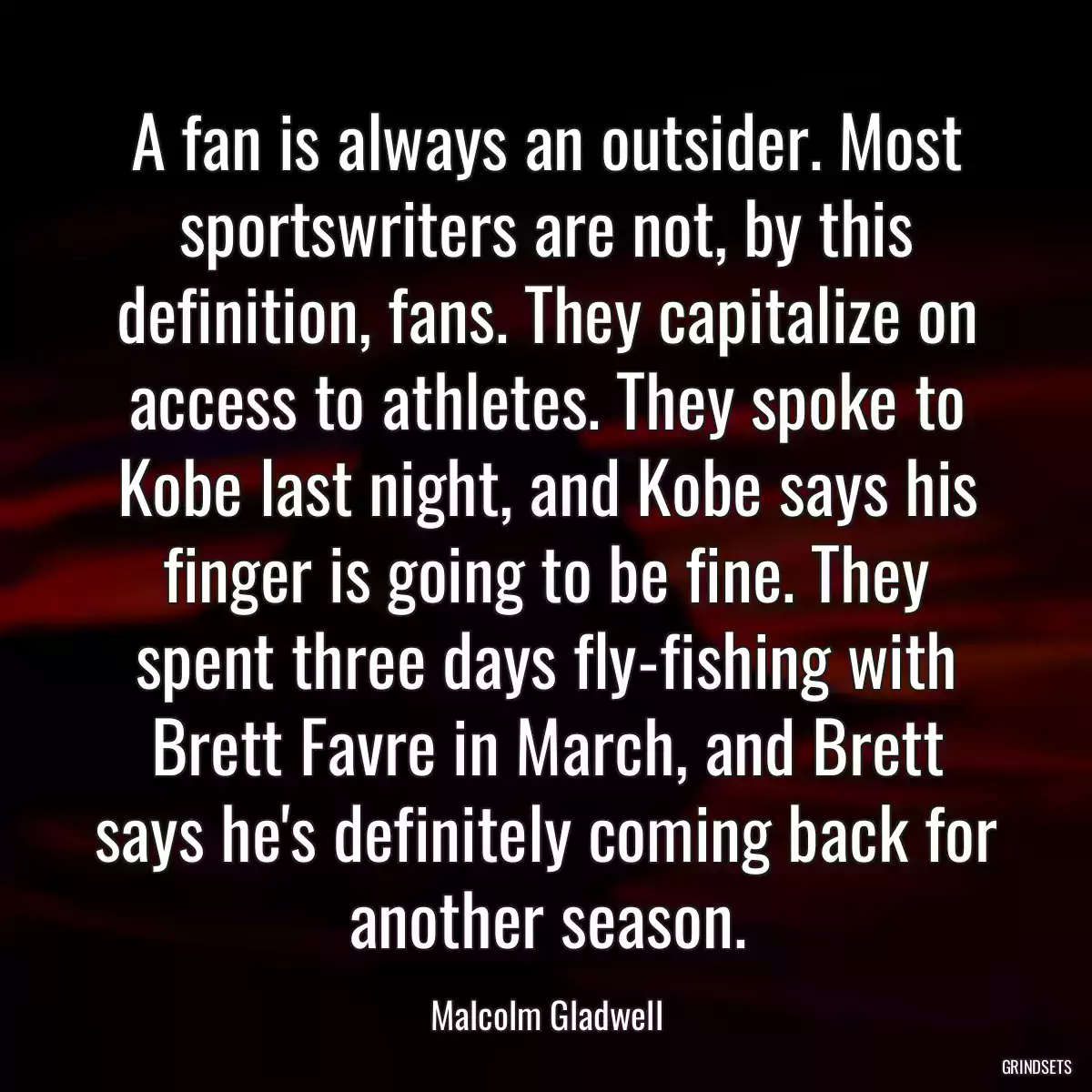
Quotes Malcolm Gladwell - page 2
Find dozens of Malcolm Gladwell with images to copy and share.

Do you see the consequences of the way we have chosen to think about success? Because we so profoundly personalize success, we miss opportunities to lift others onto the top rung...We are too much in awe of those who succeed and far too dismissive of those who fail. And most of all, we become much too passive. We overlook just how large a role we all play—and by we I mean society—in determining who makes it and who doesn’t.
Incompetence is certainty in the absence of expertise. Overconfidence is certainty in the presence of expertise.
Track is full of the absolute nicest and most polite athletes in all of sports, and where does it get us?
You may also like
An aggressive drug-testing program would cut down on certain abuses, but its never going to catch everyone - or even close to everyone.
There is this tremendous body of knowledge in the world of academia where extraordinary numbers of incredibly thoughtful people have taken the time to examine on a really profound level the way we live our lives and who we are and where we've been. That brilliant learning sometimes gets trapped in academia and never sees the light of day.
When the students were asked to identify their race on a pretest questionnaire, that simple act was sufficient to prime them with all the negative stereotypes associated with African Americans and academic achievement. If a white student from a prestigious private high school gets a higher SAT score than a black student from an inner-city school, is it because she’s truly a better student, or is it because to be white and to attend a prestigious high school is to be constantly primed with the idea of smart?
If we are to learn to improve the quality of the decisions we make, we need to accept the mysterious nature of our snap judgments.
Our world requires that decisions be sourced and footnoted, and if we say how we feel, we must also be prepared to elaborate on why we feel that way...We need to respect the fact that it is possible to know without knowing why we know and accept that - sometimes - we're better off that way.

A fan is always an outsider. Most sportswriters are not, by this definition, fans. They capitalize on access to athletes. They spoke to Kobe last night, and Kobe says his finger is going to be fine. They spent three days fly-fishing with Brett Favre in March, and Brett says he's definitely coming back for another season.
The lesson here is very simple. But it is striking how often it is overlooked. We are so caught in the myths of the best and the brightest and the self-made that we think outliers spring naturally from the earth. We look at the young Bill Gates and marvel that our world allowed that thirteen-year-old to become a fabulously successful entrepreneur. But that's the wrong lesson. Our world only allowed one thirteen-year-old unlimited access to a time sharing terminal in 1968. If a million teenagers had been given the same opportunity, how many more Microsofts would we have today?
To build a better world we need to replace the patchwork of lucky breaks and arbitrary advantages today that determine success--the fortunate birth dates and the happy accidents of history--with a society that provides opportunities for all.
Economists often talk about the 80/20 Principle, which is the idea that in any situation roughly 80 percent of the work will be done by 20 percent of the participants. In most societies, 20 percent of criminals commit 80 percent of crimes. Twenty percent of motorists cause 80 percent of all accidents. Twenty percent of beer drinkers drink 80 percent of all beer. When it comes to epidemics, though, this disproportionality becomes even more extreme: a tiny percentage of people do the majority of the work.
Nobody accomplishes success by themselves.
The great accomplishment of Jobs's life is how effectively he put his idiosyncrasies - his petulance, his narcissism, and his rudeness - in the service of perfection.
The Tipping Point is the biography of an idea, and the idea is very simple. It is that the best way to understand the emergence of fashion trends, the ebb and flow of crime waves, or, for that matter, the transformation of unknown books into bestsellers, or the rise of teenage smoking, or the phenomena of word of mouth, or any number of the other mysterious changes that mark everyday life is to think of them as epidemics. Ideas and products and messages and behaviors spread just like viruses do.
Success is not a function of individual talent. It's the steady accumulation of advantages. It's bound up in so many other broader circumstantial, environmental, historical, and cultural factors.
Starting epidemics requires concentrating resources on a few key area. The Law of the Few says that Connectors, Mavens, and Salesman are responsible for starting word-of-mouth epidemics, which means that if you are interested in starting a word-of-mouth epidemic , your resources ought to be solely concentrated on these three groups. No one else matters.
You may also like

Have you ever wondered... how religious movements get started? Usually, we think of them as a product of highly charismatic evangelists... but the spread of any new and contagious ideology also has a lot to do with the skillful use of group power.